VCLT[1]维也纳条约法公约
维也纳条约法公约中英文版

Vienna Convention on the Law of Treaties 1969维也纳条约法公约The States Parties to the present Convention,本公约各当事国,Considering the fundamental role of treaties in the history of international relations,鉴于条约在国际关系历史上之基本地位,Recognizing the ever-increasing importance of treaties as a source of international law and as a means of developing peaceful cooperation among nations, whatever their constitutional and social systems,承认条约为国际法渊源之一,且为各国间不分宪法及社会制度发展和平合作之工具,其重要性日益增加,Noting that the principles of free consent and of good faith and the pacta sunt servanda rule are universally recognized,鉴悉自由同意与善意之原则以及条约必须遵守规则及举世所承认,Affirming that disputes concerning treaties, like other international disputes, should be settled by peaceful means and in conformity with the principles of justice and international law,确认凡关于条约之争端与其他国际争端同,皆应以和平方法且依正义及国际法之原则解决之,Recalling the determination of the peoples of the United Nations to establish conditions under which justice and respect for the obligations arising from treaties can be maintained,念及联合国人民同兹决心创造适当环境俾克维持正义及尊重由条约而起之义务,Having in mind the principles of international law embodied in the Charter of the United Nations, such as the principles of the equal rights and self-determination of peoples, of the sovereign equality and independence of all States, of non-interference in the domestic affairs of States, of the prohibition of the threat or use of force and of universal respect for, and observance of, human rights and fundamental freedoms for all,鉴及联合国宪章所载之国际法原则,诸如人民平等权利及自决,所有国家主权平等及独立,不干涉各国内政,禁止使用威胁或武力以及普遍尊重与遵守全体人类之人权及基本自由等原则。
维也纳条约法公约中英文版
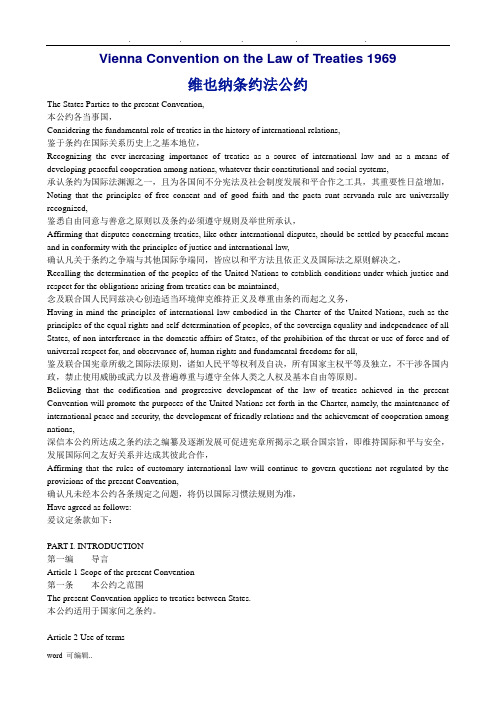
Vienna Convention on the Law of Treaties 1969维也纳条约法公约The States Parties to the present Convention,本公约各当事国,Considering the fundamental role of treaties in the history of international relations,鉴于条约在国际关系历史上之基本地位,Recognizing the ever-increasing importance of treaties as a source of international law and as a means of developing peaceful cooperation among nations, whatever their constitutional and social systems,承认条约为国际法渊源之一,且为各国间不分宪法及社会制度发展和平合作之工具,其重要性日益增加,Noting that the principles of free consent and of good faith and the pacta sunt servanda rule are universally recognized,鉴悉自由同意与善意之原则以及条约必须遵守规则及举世所承认,Affirming that disputes concerning treaties, like other international disputes, should be settled by peaceful means and in conformity with the principles of justice and international law,确认凡关于条约之争端与其他国际争端同,皆应以和平方法且依正义及国际法之原则解决之,Recalling the determination of the peoples of the United Nations to establish conditions under which justice and respect for the obligations arising from treaties can be maintained,念及联合国人民同兹决心创造适当环境俾克维持正义及尊重由条约而起之义务,Having in mind the principles of international law embodied in the Charter of the United Nations, such as the principles of the equal rights and self-determination of peoples, of the sovereign equality and independence of all States, of non-interference in the domestic affairs of States, of the prohibition of the threat or use of force and of universal respect for, and observance of, human rights and fundamental freedoms for all,鉴及联合国宪章所载之国际法原则,诸如人民平等权利及自决,所有国家主权平等及独立,不干涉各国内政,禁止使用威胁或武力以及普遍尊重与遵守全体人类之人权及基本自由等原则。
《维也纳条约法公约》第31.1条“通常含义”研究
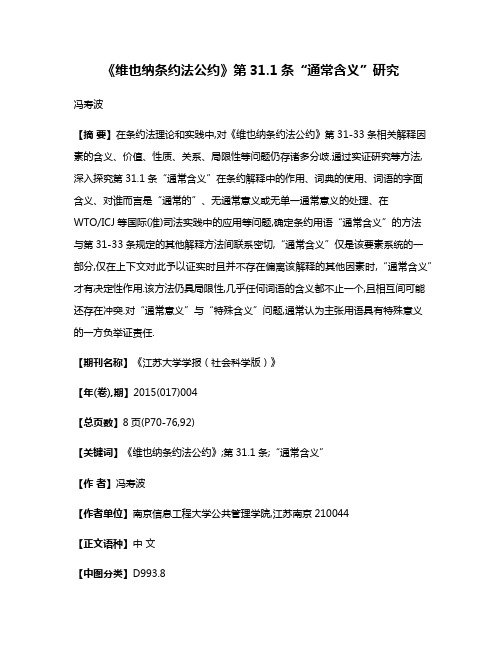
《维也纳条约法公约》第31.1条“通常含义”研究冯寿波【摘要】在条约法理论和实践中,对《维也纳条约法公约》第31-33条相关解释因素的含义、价值、性质、关系、局限性等问题仍存诸多分歧.通过实证研究等方法,深入探究第31.1条“通常含义”在条约解释中的作用、词典的使用、词语的字面含义、对谁而言是“通常的”、无通常意义或无单一通常意义的处理、在WTO/ICJ等国际(准)司法实践中的应用等问题,确定条约用语“通常含义”的方法与第31-33条规定的其他解释方法间联系密切,“通常含义”仅是该要素系统的一部分,仅在上下文对此予以证实时且并不存在偏离该解释的其他因素时,“通常含义”才有决定性作用.该方法仍具局限性,几乎任何词语的含义都不止一个,且相互间可能还存在冲突.对“通常意义”与“特殊含义”问题,通常认为主张用语具有特殊意义的一方负举证责任.【期刊名称】《江苏大学学报(社会科学版)》【年(卷),期】2015(017)004【总页数】8页(P70-76,92)【关键词】《维也纳条约法公约》;第31.1条;“通常含义”【作者】冯寿波【作者单位】南京信息工程大学公共管理学院,江苏南京210044【正文语种】中文【中图分类】D993.8H.Grotius曾主张:“如果不存在表明其他不同结论的含义(implication),就依其自然意义(sense)来理解词语,不是依据其派生的语法上的意义,而是依据现在的用法。
”[1]409虽然法律界普遍要求“不允许解释不必要解释的词语”,然而,实践中,涉及条约的争议常常是在条约用语解释或理解上存在分歧,这是因为“条约是谈判导致妥协以调解经常是广泛的分歧的产物。
就多边条约而言,谈判国的数目越多,满足各方冲突利益的富于想象力的灵活起草的需要就越大。
这一过程不可避免地产生了许多不清楚或模棱两可的用词。
尽管在起草时非常小心并积累了很多经验,但没有任何条约是不可能产生一些解释问题的”[2]200。
维也纳条约法公约的主要内容

维也纳条约法公约的主要内容维也纳条约法公约(英文简称VCLT)是有关国际条约的国际法条约,于1969年5月22日通过[2],1969年5月23日开放供国家签署[1]。
该公约在1980年1月27日生效。
[1]截至2010年11月,已有111个国家批准维也纳条约法公约[3],还没有批准的国家仍可能承认它具有约束力,因它已成为国际间的习惯法。
该公约将几个当代国际法的基石编成法典。
它将条约定义为“国家间所缔结而以国际法为准之国际书面协定”,又订明“每一国家皆有缔结条约之能力”。
该公约已被公认为有关条约的形成和影响的权威指南。
大多数国家,无论有否加入公约,均以它为“各条约的条约”。
《维也纳条约法公约》第31.3条“任何相关国际法规则”研究
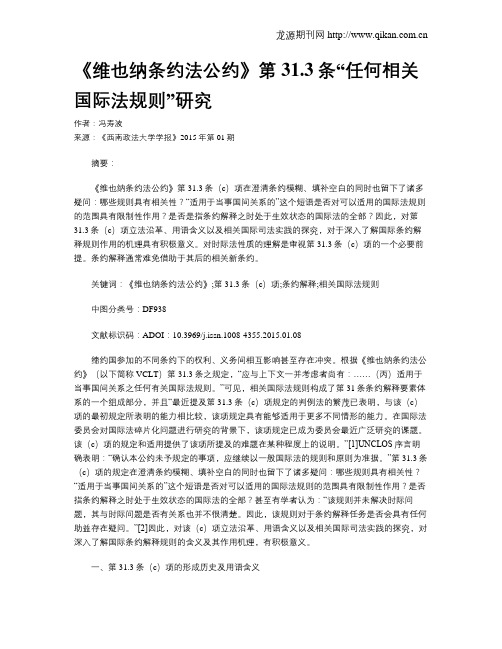
《维也纳条约法公约》第31.3条“任何相关国际法规则”研究作者:冯寿波来源:《西南政法大学学报》2015年第01期摘要:《维也纳条约法公约》第31.3条(c)项在澄清条约模糊、填补空白的同时也留下了诸多疑问:哪些规则具有相关性?“适用于当事国间关系的”这个短语是否对可以适用的国际法规则的范围具有限制性作用?是否是指条约解释之时处于生效状态的国际法的全部?因此,对第31.3条(c)项立法沿革、用语含义以及相关国际司法实践的探究,对于深入了解国际条约解释规则作用的机理具有积极意义。
对时际法性质的理解是审视第31.3条(c)项的一个必要前提。
条约解释通常难免借助于其后的相关新条约。
关键词:《维也纳条约法公约》;第31.3条(c)项;条约解释;相关国际法规则中图分类号:DF938文献标识码:ADOI:10.3969/j.issn.1008-4355.2015.01.08缔约国参加的不同条约下的权利、义务间相互影响甚至存在冲突。
根据《维也纳条约法公约》(以下简称VCLT)第31.3条之规定,“应与上下文一并考虑者尚有:……(丙)适用于当事国间关系之任何有关国际法规则。
”可见,相关国际法规则构成了第31条条约解释要素体系的一个组成部分,并且“最近提及第31.3条(c)项规定的判例法的繁茂已表明,与该(c)项的最初规定所表明的能力相比较,该项规定具有能够适用于更多不同情形的能力。
在国际法委员会对国际法碎片化问题进行研究的背景下,该项规定已成为委员会最近广泛研究的课题。
该(c)项的规定和适用提供了该项所提及的难题在某种程度上的说明。
”[1]UNCLOS序言明确表明:“确认本公约未予规定的事项,应继续以一般国际法的规则和原则为准据。
”第31.3条(c)项的规定在澄清条约模糊、填补空白的同时也留下了诸多疑问:哪些规则具有相关性?“适用于当事国间关系的”这个短语是否对可以适用的国际法规则的范围具有限制性作用?是否指条约解释之时处于生效状态的国际法的全部?甚至有学者认为:“该规则并未解决时际问题,其与时际问题是否有关系也并不很清楚。
维也纳条约法公约中英文版
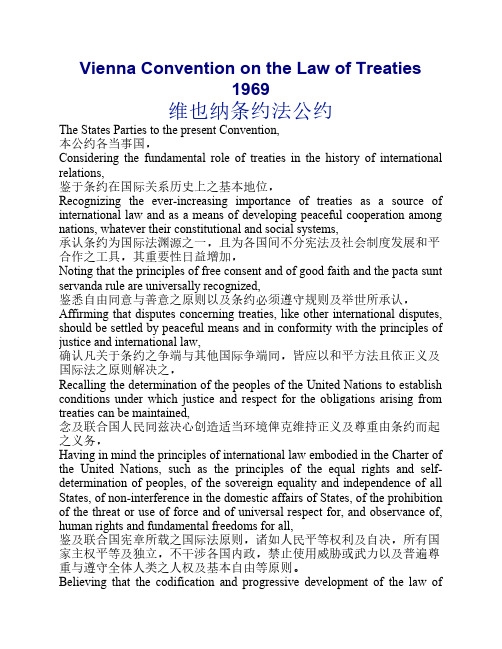
Vienna Convention on the Law of Treaties1969维也纳条约法公约The States Parties to the present Convention,本公约各当事国,Considering the fundamental role of treaties in the history of international relations,鉴于条约在国际关系历史上之基本地位,Recognizing the ever-increasing importance of treaties as a source of international law and as a means of developing peaceful cooperation among nations, whatever their constitutional and social systems,承认条约为国际法渊源之一,且为各国间不分宪法及社会制度发展和平合作之工具,其重要性日益增加,Noting that the principles of free consent and of good faith and the pacta sunt servanda rule are universally recognized,鉴悉自由同意与善意之原则以及条约必须遵守规则及举世所承认,Affirming that disputes concerning treaties, like other international disputes, should be settled by peaceful means and in conformity with the principles of justice and international law,确认凡关于条约之争端与其他国际争端同,皆应以和平方法且依正义及国际法之原则解决之,Recalling the determination of the peoples of the United Nations to establish conditions under which justice and respect for the obligations arising from treaties can be maintained,念及联合国人民同兹决心创造适当环境俾克维持正义及尊重由条约而起之义务,Having in mind the principles of international law embodied in the Charter of the United Nations, such as the principles of the equal rights and self-determination of peoples, of the sovereign equality and independence of all States, of non-interference in the domestic affairs of States, of the prohibition of the threat or use of force and of universal respect for, and observance of, human rights and fundamental freedoms for all,鉴及联合国宪章所载之国际法原则,诸如人民平等权利及自决,所有国家主权平等及独立,不干涉各国内政,禁止使用威胁或武力以及普遍尊重与遵守全体人类之人权及基本自由等原则。
维也纳条约法公约中英文版

Vienna Convention on the Law of Treaties1969维也纳条约法公约The States Parties to the present Convention,本公约各当事国,Considering the fundamental role of treaties in the history of international relations,鉴于条约在国际关系历史上之基本地位,Recognizing the ever-increasing importance of treaties as a source of international law and as a means of developing peaceful cooperation among nations, whatever their constitutional and social systems,承认条约为国际法渊源之一,且为各国间不分宪法及社会制度发展和平合作之工具,其重要性日益增加,Noting that the principles of free consent and of good faith and the pacta sunt servanda rule are universally recognized,鉴悉自由同意与善意之原则以及条约必须遵守规则及举世所承认,Affirming that disputes concerning treaties, like other international disputes, should be settled by peaceful means and in conformity with the principles of justice and international law,确认凡关于条约之争端与其他国际争端同,皆应以和平方法且依正义及国际法之原则解决之,Recalling the determination of the peoples of the United Nations to establish conditions under which justice and respect for the obligations arising from treaties can be maintained,念及联合国人民同兹决心创造适当环境俾克维持正义及尊重由条约而起之义务,Having in mind the principles of international law embodied in the Charter of the United Nations, such as the principles of the equal rights and self-determination of peoples, of the sovereign equality and independence of all States, of non-interference in the domestic affairs of States, of the prohibition of the threat or use of force and of universal respect for, and observance of, human rights and fundamental freedoms for all,鉴及联合国宪章所载之国际法原则,诸如人民平等权利及自决,所有国家主权平等及独立,不干涉各国内政,禁止使用威胁或武力以及普遍尊重与遵守全体人类之人权及基本自由等原则。
《维也纳条约法公约》第31.3条“Subsequent Practice”研究

《维也纳条约法公约》第31.3条“Subsequent Practice”研究摘要:从国际法制和相关案例来看,嗣后惯例的效力和构成要素是模糊的。
嗣后惯例并非正式的、文本性协定,其解释性价值完全依赖于一致性的行为、所有当事方间达成的协定和作为单一的自主解释之合成解释。
嗣后惯例必须是确立了当事方间的协定,当事方在条约履行中明确地实施了本质上相同或一致的行为。
嗣后惯例的效力是一个颇有争议的问题,尤其是部分缔约方的惯行对原条约和其他缔约方的效力问题。
相互矛盾的嗣后惯例会有不同的效力,这取决于所涉的多边条约机制。
该惯例的形成有赖于国家在适用条约时有机会采取某些行动,并不要求每个当事方都必须单独地实施足以被接受为惯例的行为,只需要所有当事方接受,甚至是默示地接受。
嗣后惯例与嗣后协定间存在联系与差异。
关键词:《维也纳条约法公约》;条约解释;嗣后惯例中图分类号:DF938文献标识码:A DOI:10.3969/j.issn.1008-4355.2014.02.08条约解释是国际法的一个重要领域,绝大多数国际争端都会涉及条约解释问题,特别是既存条约如何因应国际法律环境和科技发展的变化问题。
《维也纳条约法公约》(下称VCLT)第31-32条规定了诸多条约解释要素,是进行条约解释的主要方法。
除规定嗣后协定和适用于当事国间关系之任何有关国际法规则外,根据第31.3条之规定,“应与上下文一并考虑者尚有:……(b)嗣后在条约适用方面确定各当事国对条约解释之协定之任何惯例。
”由此可知,嗣后惯例与“上下文”等其他条约解释要素一道成为第31条规定的条约“解释之通则”的一个重要部分。
学界对于第31.3条的研究尚有待加强,特别是嗣后惯例如何对条约解释产生可能的影响。
因此,对于嗣后惯例的含义、构成要素、ICJ/WTO 等相关(准)司法实践以及与其他条约解释要素的比较等问题的探讨,具有重要意义。
目前,在国内外学界,由于嗣后惯例涉及诸多复杂问题,对一些问题的研究并无定论。
《维也纳条约法公约 》作为解释

尊敬的读者:本文将围绕维也纳条约法公约展开讨论,通过对其内容、历史、意义和影响等方面的解释,以期为读者对该条约公约有一个更加清晰和全面的了解。
一、维也纳条约法公约的内容维也纳条约法公约是一份重要的国际法公约,于1969年签署,1970年生效。
该公约的主要内容包括了国家之间的条约签署与生效、条约的解释、条约的执行、条约的结束与修改等方面的规定。
这些规定为国际社会的条约签署和实施提供了重要的法律基础。
二、维也纳条约法公约的历史维也纳条约法公约的签署和生效标志着国际社会对于条约法的规范化和法律化。
在此之前,虽然国际社会已经存在对条约签署、生效和执行等方面的规范,但这些规范大多只是习惯法,并缺乏法律约束力。
维也纳条约法公约的出台填补了国际条约法的空白,为国际社会的条约签署和实施提供了更加明确和可操作的指导。
三、维也纳条约法公约的意义作为一份国际法公约,维也纳条约法公约的意义不仅在于其为国际社会提供了关于条约签署和执行的具体规定,更在于它为国际法的发展做出了重要贡献。
该公约的出台和生效,标志着国际法向着规范化和法律化的方向发展,使得国际社会的行为更加有序和可预期,为国际合作和发展提供了法律保障。
四、维也纳条约法公约的影响维也纳条约法公约的出台和生效对于国际社会的影响是深远的。
该公约规定了国家之间的条约签署和生效的程序和要求,为国际社会的条约签署提供了具体的规范,增强了国际社会对于条约的尊重和执行。
该公约规定了条约的解释和执行的方法和程序,为国际社会解决因条约解释和执行而产生的争端提供了依据和程序,增强了国际社会的合作和稳定。
再次,该公约规定了条约的结束和修改的程序和要求,为国际社会结束和修改条约提供了具体的规范,增强了国际社会的合作和灵活性。
该公约的出台和生效为国际法的发展提供了典范和样本,促进了国际法的规范化和法律化,为国际社会的合作和发展提供了法律保障。
五、结语维也纳条约法公约作为一份重要的国际法公约,不仅为国际社会的条约签署和实施提供了具体的规定,更在于它为国际法的发展做出了重要贡献。
1969维也纳条约法公约
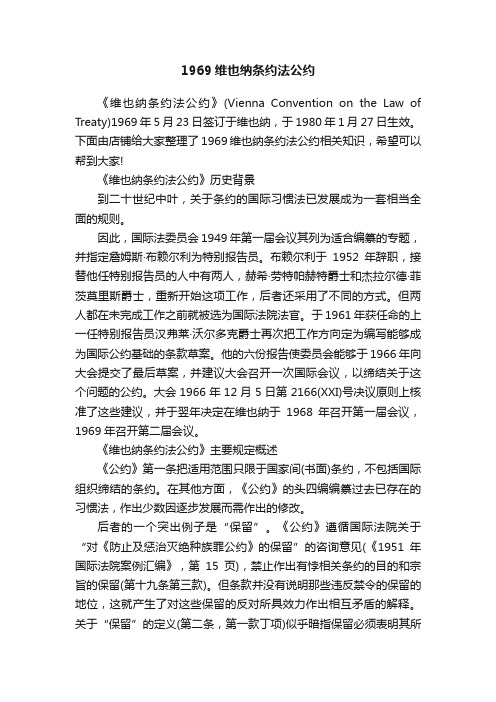
1969维也纳条约法公约《维也纳条约法公约》(Vienna Convention on the Law of Treaty)1969年5月23日签订于维也纳,于1980年1月27日生效。
下面由店铺给大家整理了1969维也纳条约法公约相关知识,希望可以帮到大家!《维也纳条约法公约》历史背景到二十世纪中叶,关于条约的国际习惯法已发展成为一套相当全面的规则。
因此,国际法委员会1949年第一届会议其列为适合编纂的专题,并指定詹姆斯·布赖尔利为特别报告员。
布赖尔利于1952年辞职,接替他任特别报告员的人中有两人,赫希·劳特帕赫特爵士和杰拉尔德·菲茨莫里斯爵士,重新开始这项工作,后者还采用了不同的方式。
但两人都在未完成工作之前就被选为国际法院法官。
于1961年获任命的上一任特别报告员汉弗莱·沃尔多克爵士再次把工作方向定为编写能够成为国际公约基础的条款草案。
他的六份报告使委员会能够于1966年向大会提交了最后草案,并建议大会召开一次国际会议,以缔结关于这个问题的公约。
大会1966年12月5日第2166(XXI)号决议原则上核准了这些建议,并于翌年决定在维也纳于1968年召开第一届会议,1969年召开第二届会议。
《维也纳条约法公约》主要规定概述《公约》第一条把适用范围只限于国家间(书面)条约,不包括国际组织缔结的条约。
在其他方面,《公约》的头四编编纂过去已存在的习惯法,作出少数因逐步发展而需作出的修改。
后者的一个突出例子是“保留”。
《公约》遵循国际法院关于“对《防止及惩治灭绝种族罪公约》的保留”的咨询意见(《1951年国际法院案例汇编》,第15页),禁止作出有悖相关条约的目的和宗旨的保留(第十九条第三款)。
但条款并没有说明那些违反禁令的保留的地位,这就产生了对这些保留的反对所具效力作出相互矛盾的解释。
关于“保留”的定义(第二条,第一款丁项)似乎暗指保留必须表明其所涉及的条款(“……摒除或更改……某些规定……之法律效果”,着重部分由作者标明),这就产生的一个问题,即人们对是否允许所谓的“全面保留”(例如一些保留把条约义务符合本国法律或某些宗教法作为执行这些义务的条件)产生怀疑,而对此没有结论性答复。
维也纳条约法

维也纳条约法(实用版)目录1.维也纳条约法的背景与历史2.维也纳条约法的主要内容与特点3.维也纳条约法的影响与现实意义正文维也纳条约法,全称为《维也纳条约法公约》,是国际法领域的一部重要法律文件。
它诞生于 1969 年,是国际社会为了统一各国条约法的实践和规定,以和平解决国际争端为目的而制定的一部条约。
维也纳条约法的背景与历史可以追溯到 19 世纪末 20 世纪初,当时世界正经历着一系列国际政治、经济和法律变革。
在此背景下,各国对于条约法的认识和实践逐渐深化,条约法也逐渐成为国际法的重要组成部分。
然而,各国在条约法的具体实施上仍存在许多分歧,因此,统一各国的条约法规则是国际社会亟待解决的问题。
在这样的背景下,维也纳条约法应运而生。
维也纳条约法的主要内容与特点可以从以下几个方面进行概括:(1)明确了条约的定义,即条约是国际法主体间以书面形式订立的、具有法律拘束力的协议。
(2)规定了条约的缔结程序,包括谈判、签署、批准和交换文书等阶段。
(3)阐述了条约的法律地位和效力,明确了条约与国际法的关系,并规定了条约的适用、解释和修改等具体规则。
(4)规定了条约的终止和暂停施行的情形,以及条约争端的解决方式。
维也纳条约法对国际社会产生了深远的影响,不仅为各国条约活动提供了统一的法律依据,而且对国际关系的和平发展具有重要意义。
首先,维也纳条约法为各国订立条约提供了明确的法律规范,有助于维护国际关系的稳定。
其次,它为解决条约争端提供了有效的法律途径,有助于维护国际和平与安全。
最后,维也纳条约法强调条约的法律地位和效力,有利于保障国际法的权威性和公信力。
综上所述,维也纳条约法是一部具有重要现实意义的国际法法律文件,它对国际社会的和平与发展产生了深远的影响。
《维也纳条约法公约》

维也纳条约法公约(1969年5月23日订于维也纳)[本公约于1980年1月27日生效]本公约各当事国,鉴于条约在国际关系历史上之基本地位,承认条约为国际法渊源之一,且为各国间不分宪法及社会制度发展和平合作之工具,其重要性日益增加,鉴悉自由同意与善意之原则以及条约必须遵守规则乃举世所承认,确认凡关于条约之争端与其他国际争端同,皆应以和平方法且依正义及国际法之原则解决之,念及联合国人民同兹决心创造适当环境俾克维持正义及尊重由条约而起之义务,鉴及联合国宪章所载之国际法原则,诸如人民平等权利及自决,所有国家主权平等及独立,不干涉各国内政,禁止使用威胁或武力以及普遍尊重与遵守全体人类之人权及基本自由等原则。
深信本公约所达成之条约法之编纂及逐渐发展可促进宪章所揭示之联合国宗旨,即维持国际和平与安全,发展国际间之友好关系并达成其彼此合作,确认凡未经本公约各条规定之问题,将仍以国际习惯法规则为准,爰议定条款如下:第一编导言第一条本公约之范围本公约适用于国家间之条约。
第二条用语一、就适用本公约而言:(a)称“条约”者,谓国家间所缔结而以国际法为准之国际书面协定,不论其载于一项单独文书或两项以上相互有关之文书内,亦不论其特定名称如何;(b)称“批准”,“接受”,“赞同”及“加入”者,各依本义指一国据以在国际上确定其同意受条约拘束之国际行为;(c)称“全权证书”者,谓一国主管当局所颁发,指派一人或数人代表该国谈判,议定或认证条约约文,表示该国同意受条约拘束,或完成有关条约之任何其他行为之文件;(d)称“保留”者,谓一国于签署,批准、接受、赞同或加入条约时所做之片面声明,不论措辞或名称如何,其目的在摒除或更改条约中若干规定对该国适用时之法律效果;(e)称“谈判国”者,谓参与草拟及议定条约约文之国家;(f)称“缔约国”者,谓不问条约已未生效,同意受条约拘束之国家;(g)称“当事国”者,谓同意承受条约拘束及条约对其有效之国家;(h)称“第三国”者,谓非条约当事国之国家;(i)称“国际组织”者,谓政府间之组织。
维也纳条约法公约中英文版【可编辑范本】

ViennaConventionontheLawofTreaties1969维也纳条约法公约The States Parties to the present Convention,本公约各当事国,Considering the fundamental role of treatiesin thehistory ofinternationalrelations,鉴于条约在国际关系历史上之基本地位,Recognizingthe ever—increasingimportance of treatiesas asourceofintern ational law andasameans of developingpeaceful cooperation among nations,whatever their constitutional andsocialsystems,承认条约为国际法渊源之一,且为各国间不分宪法及社会制度发展和平合作之工具,其重要性日益增加,Noting that the principles of freeconsent and of good faithand the pacta sunt servand aruleareuniversally recognized,鉴悉自由同意与善意之原则以及条约必须遵守规则及举世所承认,Affirmingthat disputesconcerning treaties,likeother international disputes, should be settled by peacefulmeansandin conformity withthe principles of justiceand international law,确认凡关于条约之争端与其他国际争端同,皆应以和平方法且依正义及国际法之原则解决之,Recalling the determinationof the peoples of theUnited Nations toestablish condit ions under which justice and respect for theobligations arising fromtreaties canbe maintained,念及联合国人民同兹决心创造适当环境俾克维持正义及尊重由条约而起之义务,Having in mind theprinciples of international law embodied in the Charter ofthe Unit edNations, suchas the principles oftheequal rights and self—determination o fpeoples, ofthe sovereign equality and independence of all States,of non—interference inthedomestic affairs ofStates, ofthe prohibition of the threat orus eof force and of universal respectfor,andobservance of, human rights andfundamentalfreedoms forall,鉴及联合国宪章所载之国际法原则,诸如人民平等权利及自决,所有国家主权平等及独立,不干涉各国内政,禁止使用威胁或武力以及普遍尊重与遵守全体人类之人权及基本自由等原则.Believing that the codification andprogressivedevelopment ofthe lawof treaties achievedin the present Convention will promotethepurposes of the UnitedNationsset forth inthe Charter,namely,the maintenance of international peace and security,the development offriendly relationsand the achievement of cooperati on among nations,深信本公约所达成之条约法之编纂及逐渐发展可促进宪章所揭示之联合国宗旨,即维持国际和平与安全,发展国际间之友好关系并达成其彼此合作,Affirming that the rules of customary international law willcontinue to govern questionsnot regulated by the provisions of the present Convention,确认凡未经本公约各条规定之问题,将仍以国际习惯法规则为准,Have agreed as follows:爰议定条款如下:PART I。
维也纳条约法公约“保留之范围”的经济分析——兼评第二十一条第三款
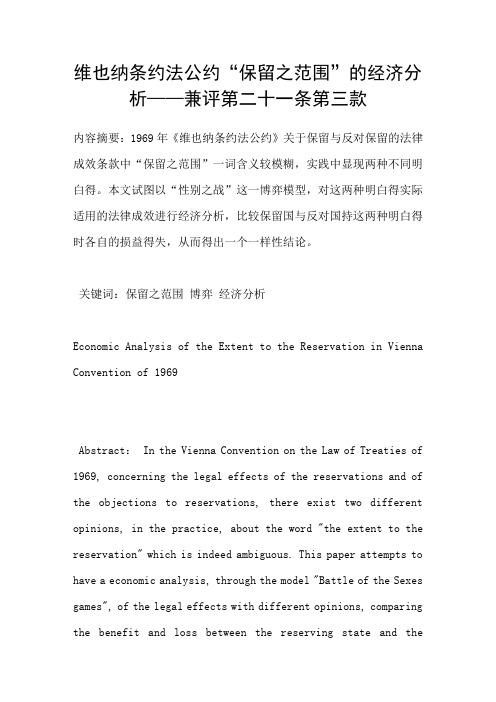
维也纳条约法公约“保留之范围”的经济分析——兼评第二十一条第三款内容摘要:1969年《维也纳条约法公约》关于保留与反对保留的法律成效条款中“保留之范围”一词含义较模糊,实践中显现两种不同明白得。
本文试图以“性别之战”这一博弈模型,对这两种明白得实际适用的法律成效进行经济分析,比较保留国与反对国持这两种明白得时各自的损益得失,从而得出一个一样性结论。
关键词:保留之范围博弈经济分析Economic Analysis of the Extent to the Reservation in Vienna Convention of 1969Abstract: In the Vienna Convention on the Law of Treaties of 1969, concerning the legal effects of the reservations and of the objections to reservations, there exist two different opinions, in the practice, about the word "the extent to the reservation" which is indeed ambiguous. This paper attempts to have a economic analysis, through the model "Battle of the Sexes games", of the legal effects with different opinions, comparing the benefit and loss between the reserving state and theobjecting state, thus having some conclusion.Key word:the extent to the reservation; Game; economic analysis保留问题是条约法中一个相当重要的问题。
- 1、下载文档前请自行甄别文档内容的完整性,平台不提供额外的编辑、内容补充、找答案等附加服务。
- 2、"仅部分预览"的文档,不可在线预览部分如存在完整性等问题,可反馈申请退款(可完整预览的文档不适用该条件!)。
- 3、如文档侵犯您的权益,请联系客服反馈,我们会尽快为您处理(人工客服工作时间:9:00-18:30)。
Vienna Convention on the Law of Treaties1969Done at Vienna on 23 May 1969. Entered into force on 27 January 1980. United Nations, Treaty Series, vol. 1155, p. 331Copyright © United Nations2005Vienna Convention on the Law of TreatiesDone at Vienna on 23 May 1969The States Parties to the present Convention,Considering the fundamental role of treaties in the history of international relations,Recognizing the ever-increasing importance of treaties as a source of international law and as a means of developing peaceful cooperation among nations, whatever their constitutional and social systems,Noting that the principles of free consent and of good faith and the pacta sunt servanda rule are universally recognized,Affirming that disputes concerning treaties, like other international disputes, should be settled by peaceful means and in conformity with the principles of justice and international law,Recalling the determination of the peoples of the United Nations to establish conditions under which justice and respect for the obligations arising from treaties can be maintained,Having in mind the principles of international law embodied in the Charter of the United Nations, such as the principles of the equal rights and self-determination of peoples, of the sovereign equality and independence of all States, of non-interference in the domestic affairs of States, of the prohibition of the threat or use of force and of universal respect for, and observance of, human rights and fundamental freedoms for all,Believing that the codification and progressive development of the law of treaties achieved in the present Convention will promote the purposes of the United Nations set forth in the Charter, namely, the maintenance of international peace and security, the development of friendly relations and the achievement of cooperation among nations,Affirming that the rules of customary international law will continue to govern questions not regulated by the provisions of the present Convention,Have agreed as follows:P ART I.I NTRODUCTIONArticle 1Scope of the present ConventionThe present Convention applies to treaties between States.Article 2Use of terms1. F or the purposes of the present Convention:(a) “treaty” means an international agreement concluded between States in written form and governed by international law, whether embodied in a single instrument or in two or more related instruments and whatever its particular designation;(b) “ratification”, “acceptance”, “approval” and “accession” mean in each case the international act so named whereby a State establishes on the international plane its consent to be bound by a treaty;(c) “full powers” means a document emanating from the competent authority of a State designating a person or persons to represent the State for negotiating, adopting or authenticating the text of a treaty, for expressing the consent of the State to be bound by a treaty, or for accomplishing any other act with respect to a treaty;(d) “reservation” means a unilateral statement, however phrased or named, made by a State, when signing, ratifying, accepting, approving or acceding to a treaty, whereby it purports to exclude or to modify the legal effect of certain provisions of the treaty in their application to that State;(e) “negotiating State” means a State which took part in the drawing up and adoption of the text of the treaty;(f) “contracting State” means a State which has consented to be bound by the treaty, whether or not the treaty has entered into force;(g) “party” means a State which has consented to be bound by the treaty and for which the treaty is in force;(h) “third State” means a State not a party to the treaty;(i) “international organization” means an intergovernmental organization.2. T he provisions of paragraph 1 regarding the use of terms in the present Convention are without prejudice to the use of those terms or to the meanings which may be given to them in the internal law of any State.Article 3International agreements not within the scopeof the present ConventionThe fact that the present Convention does not apply to international agreements concluded between States and other subjects of international law or between such other subjects of international law, or to international agreements not in written form, shall not affect:(a) the legal force of such agreements;(b) the application to them of any of the rules set forth in the present Convention to which they would be subject under international law independently of the Convention;(c) the application of the Convention to the relations of States as between themselves under international agreements to which other subjects of international law are also parties.Article 4Non-retroactivity of the present ConventionWithout prejudice to the application of any rules set forth in the present Convention to which treaties would be subject under international law independently of the Convention, the Convention applies only to treaties which are concluded by States after the entry into force of the present Convention with regard to such States.Article 5Treaties constituting international organizations and treatiesadopted within an international organizationThe present Convention applies to any treaty which is the constituent instrument of an international organization and to any treaty adopted within an international organization without prejudice to any relevant rules of the organization.P ART II.C ONCLUSION ANDE NTRY INTOF ORCE OF T REATIESSECTION 1. CONCLUSION OF TREATIESArticle 6Capacity of States to conclude treatiesEvery State possesses capacity to conclude treaties.Article 7Full powers1. A person is considered as representing a State for the purpose of adopting or authenticating the text of a treaty or for the purpose of expressing the consent of the State to be bound by a treaty if:(a) he produces appropriate full powers; or(b) it appears from the practice of the States concerned or from other circumstances that their intention was to consider that person as representing the State for such purposes and to dispense with full powers.2. I n virtue of their functions and without having to produce full powers, the following are considered as representing their State:(a) Heads of State, Heads of Government and Ministers for Foreign Affairs, for the purpose of performing all acts relating to the conclusion of a treaty;(b) heads of diplomatic missions, for the purpose of adopting the text of a treaty between the accrediting State and the State to which they are accredited;(c) representatives accredited by States to an international conference or to an international organization or one of its organs, for the purpose of adopting the text of a treaty in that conference, organization or organ.Article 8Subsequent confirmation of an act performedwithout authorizationAn act relating to the conclusion of a treaty performed by a person who cannot be considered under article 7 as authorized to represent a State for that purpose is without legal effect unless afterwards confirmed by that State.Article 9Adoption of the text1. T he adoption of the text of a treaty takes place by the consent of all the States participating in its drawing up except as provided in paragraph2.2. T he adoption of the text of a treaty at an international conference takes place by the vote of two thirds of the States present and voting, unless by the same majority they shall decide to apply a different rule.Article 10Authentication of the textThe text of a treaty is established as authentic and definitive:(a) by such procedure as may be provided for in the text or agreed upon by the States participating in its drawing up; or(b) failing such procedure, by the signature, signature ad referendum or initialling by the representatives of those States of the text of the treaty or of the Final Act of a conference incorporating the text.Article 11Means of expressing consent to be bound by a treatyThe consent of a State to be bound by a treaty may be expressed by signature, exchange of instruments constituting a treaty, ratification, acceptance, approval or accession, or by any other means if so agreed.Article 12Consent to be bound by a treaty expressed by signature1. T he consent of a State to be bound by a treaty is expressed by the signature of its representative when:(a) the treaty provides that signature shall have that effect;(b) it is otherwise established that the negotiating States were agreed that signature should have that effect; or(c) the intention of the State to give that effect to the signature appears from the full powers of its representative or was expressed during the negotiation.2. F or the purposes of paragraph 1:(a) the initialling of a text constitutes a signature of the treaty when it is established that the negotiating States so agreed;(b) the signature ad referendum of a treaty by a representative, if confirmed by his State, constitutes a full signature of the treaty.Article 13Consent to be bound by a treaty expressed by anexchange of instruments constituting a treatyThe consent of States to be bound by a treaty constituted by instruments exchanged between them is expressed by that exchange when:(a) the instruments provide that their exchange shall have that effect; or(b) it is otherwise established that those States were agreed that the exchange of instruments should have that effect.Article 14Consent to be bound by a treaty expressed by ratification,acceptance or approval1. T he consent of a State to be bound by a treaty is expressed by ratification when:(a) the treaty provides for such consent to be expressed by means of ratification;(b) it is otherwise established that the negotiating States were agreed that ratification should be required;(c) the representative of the State has signed the treaty subject to ratification; or(d) the intention of the State to sign the treaty subject to ratification appears from the full powers of its representative or was expressed during the negotiation.2. T he consent of a State to be bound by a treaty is expressed by acceptance or approval under conditions similar to those which apply to ratification.Article 15Consent to be bound by a treaty expressed by accessionThe consent of a State to be bound by a treaty is expressed by accession when:(a) the treaty provides that such consent may be expressed by that State by means of accession;(b) it is otherwise established that the negotiating States were agreed that such consent may be expressed by that State by means of accession; or(c) all the parties have subsequently agreed that such consent may be expressed by that State by means of accession.Article 16Exchange or deposit of instruments of ratification,acceptance, approval or accessionUnless the treaty otherwise provides, instruments of ratification, acceptance, approval or accession establish the consent of a State to be bound by a treaty upon:(a) their exchange between the contracting States;(b) their deposit with the depositary; or(c) their notification to the contracting States or to the depositary, if so agreed.Article 17Consent to be bound by part of a treaty andchoice of differing provisions1. W ithout prejudice to articles 19 to 23, the consent of a State to be bound by part of a treaty is effective only if the treaty so permits or the other contracting States so agree.2. T he consent of a State to be bound by a treaty which permits a choice between differing provisions is effective only if it is made clear to which of the provisions the consent relates.Article 18Obligation not to defeat the object and purposeof a treaty prior to its entry into forceA State is obliged to refrain from acts which would defeat the object and purpose of a treaty when:(a) it has signed the treaty or has exchanged instruments constituting the treaty subject to ratification, acceptance or approval, until it shall have made its intention clear not to become a party to the treaty; or(b) it has expressed its consent to be bound by the treaty, pending the entry into force of the treaty and provided that such entry into force is not unduly delayed.SECTION 2. RESERVATIONSArticle 19Formulation of reservationsA State may, when signing, ratifying, accepting, approving or acceding to a treaty, formulate a reservation unless:(a) the reservation is prohibited by the treaty;(b) the treaty provides that only specified reservations, which do not include the reservation in question, may be made; or(c) in cases not failing under subparagraphs (a) and (b), the reservation is incompatible with the object and purpose of the treaty.Article 20Acceptance of and objection to reservations1. A reservation expressly authorized by a treaty does not require any subsequent acceptance by the other contracting States unless the treaty so provides.2. W hen it appears from the limited number of the negotiating States and the object and purpose ofa treaty that the application of the treaty in its entirety between all the parties is an essential condition of the consent of each one to be bound by the treaty, a reservation requires acceptance by all the parties.3. W hen a treaty is a constituent instrument of an international organization and unless it otherwise provides, a reservation requires the acceptance of the competent organ of that organization.4. I n cases not falling under the preceding paragraphs and unless the treaty otherwise provides:(a) acceptance by another contracting State of a reservation constitutes the reserving State a party to the treaty in relation to that other State if or when the treaty is in force for those States;(b) an objection by another contracting State to a reservation does not preclude the entry into force of the treaty as between the objecting and reserving States unless a contrary intention is definitely expressed by the objecting State;(c) an act expressing a State’s consent to be bound by the treaty and containing a reservation is effective as soon as at least one other contracting State has accepted the reservation.5. F or the purposes of paragraphs 2 and 4 and unless the treaty otherwise provides, a reservation is considered to have been accepted by a State if it shall have raised no objection to the reservation by the end of a period of twelve months after it was notified of the reservation or by the date on which it expressed its consent to be bound by the treaty, whichever is later.Article 21Legal effects of reservations and of objections to reservations1. A reservation established with regard to another party in accordance with articles 19, 20 and 23:(a) modifies for the reserving State in its relations with that other party the provisions of the treaty to which the reservation relates to the extent of the reservation; and(b) modifies those provisions to the same extent for that other party in its relations with the reserving State.2. T he reservation does not modify the provisions of the treaty for the other parties to the treaty inter se.3. W hen a State objecting to a reservation has not opposed the entry into force of the treaty between itself and the reserving State, the provisions to which the reservation relates do not apply as between the two States to the extent of the reservation.Article 22Withdrawal of reservations and ofobjections to reservations1. U nless the treaty otherwise provides, a reservation may be withdrawn at any time and the consent of a State which has accepted the reservation is not required for its withdrawal.2. U nless the treaty otherwise provides, an objection to a reservation may be withdrawn at any time.3. U nless the treaty otherwise provides, or it is otherwise agreed:(a) the withdrawal of a reservation becomes operative in relation to another contracting State only when notice of it has been received by that State;(b) the withdrawal of an objection to a reservation becomes operative only when notice of it has been received by the State which formulated the reservation.Article 23Procedure regarding reservations1. A reservation, an express acceptance of a reservation and an objection to a reservation must be formulated in writing and communicated to the contracting States and other States entitled to become parties to the treaty.2. I f formulated when signing the treaty subject to ratification, acceptance or approval, a reservation must be formally confirmed by the reserving State when expressing its consent to be bound by the treaty. In such a case the reservation shall be considered as having been made on the date of its confirmation.3. A n express acceptance of, or an objection to, a reservation made previously to confirmation of the reservation does not itself require confirmation.4. T he withdrawal of a reservation or of an objection to a reservation must be formulated in writing.SECTION 3. ENTRY INTO FORCE AND PROVISIONAL,APPLICATION OF TREATIESArticle 24Entry into force1. A treaty enters into force in such manner and upon such date as it may provide or as the negotiating States may agree.2. F ailing any such provision or agreement, a treaty enters into force as soon as consent to be bound by the treaty has been established for all the negotiating States.3. W hen the consent of a State to be bound by a treaty is established on a date after the treaty has come into force, the treaty enters into force for that State on that date, unless the treaty otherwise provides.4. T he provisions of a treaty regulating the authentication of its text, the establishment of the consent of States to be bound by the treaty, the manner or date of its entry into force, reservations, the functions of the depositary and other matters arising necessarily before the entry into force of the treaty apply from the time of the adoption of its text.Provisional application1. A treaty or a part of a treaty is applied provisionally pending its entry into force if:(a) the treaty itself so provides; or(b) the negotiating States have in some other manner so agreed.2. U nless the treaty otherwise provides or the negotiating States have otherwise agreed, the provisional application of a treaty or a part of a treaty with respect to a State shall be terminated if that State notifies the other States between which the treaty is being applied provisionally of its intention not to become a party to the treaty.P ART III.O BSERVANCE,A PPLICATION ANDI NTERPRETATION OF T REATIESSECTION 1. OBSERVANCE OF TREATIESArticle 26“Pacta sunt servanda”Every treaty in force is binding upon the parties to it and must be performed by them in good faith.Article 27Internal law and observance of treatiesA party may not invoke the provisions of its internal law as justification for its failure to perform a treaty. This rule is without prejudice to article 46.SECTION 2. APPLICATION OF TREATIESArticle 28Non-retroactivity of treatiesUnless a different intention appears from the treaty or is otherwise established, its provisions do not bind a party in relation to any act or fact which took place or any situation which ceased to exist before the date of the entry into force of the treaty with respect to that party.Article 29Territorial scope of treatiesUnless a different intention appears from the treaty or is otherwise established, a treaty is binding upon each party in respect of its entire territory.Application of successive treaties relating tothe same subject matter1. S ubject to Article 103 of the Charter of the United Nations, the rights and obligations of States Parties to successive treaties relating to the same subject matter shall be determined in accordance with the following paragraphs.2. W hen a treaty specifies that it is subject to, or that it is not to be considered as incompatible with, an earlier or later treaty, the provisions of that other treaty prevail.3. W hen all the parties to the earlier treaty are parties also to the later treaty but the earlier treaty is not terminated or suspended in operation under article 59, the earlier treaty applies only to the extent that its provisions are compatible with those of the later treaty.4. W hen the parties to the later treaty do not include all the parties to the earlier one:(a) as between States Parties to both treaties the same rule applies as in paragraph 3;(b) as between a State party to both treaties and a State party to only one of the treaties, the treaty to which both States are parties governs their mutual rights and obligations.5. P aragraph 4 is without prejudice to article 41, or to any question of the termination or suspension of the operation of a treaty under article 60 or to any question of responsibility which may arise for a State from the conclusion or application of a treaty the provisions of which are incompatible with its obligations towards another State under another treaty.SECTION 3. I NTERPRETATION OF TREATIESArticle 31General rule of interpretation1. A treaty shall be interpreted in good faith in accordance with the ordinary meaning to be given to the terms of the treaty in their context and in the light of its object and purpose.2. T he context for the purpose of the interpretation of a treaty shall comprise, in addition to the text, including its preamble and annexes:(a) any agreement relating to the treaty which was made between all the parties in connection with the conclusion of the treaty;(b) any instrument which was made by one or more parties in connection with the conclusion of the treaty and accepted by the other parties as an instrument related to the treaty.3. T here shall be taken into account, together with the context:(a) any subsequent agreement between the parties regarding the interpretation of the treaty or the application of its provisions;(b) any subsequent practice in the application of the treaty which establishes the agreement of the parties regarding its interpretation;(c) any relevant rules of international law applicable in the relations between the parties.4. A special meaning shall be given to a term if it is established that the parties so intended.Article 32Supplementary means of interpretationRecourse may be had to supplementary means of interpretation, including the preparatory work of the treaty and the circumstances of its conclusion, in order to confirm the meaning resulting from the application of article 31, or to determine the meaning when the interpretation according to article 31:(a) leaves the meaning ambiguous or obscure; or(b) leads to a result which is manifestly absurd or unreasonable.Article 33Interpretation of treaties authenticated in two or more languages1. W hen a treaty has been authenticated in two or more languages, the text is equally authoritative in each language, unless the treaty provides or the parties agree that, in case of divergence, a particular text shall prevail.2. A version of the treaty in a language other than one of those in which the text was authenticated shall be considered an authentic text only if the treaty so provides or the parties so agree.3. T he terms of the treaty are presumed to have the same meaning in each authentic text.4. E xcept where a particular text prevails in accordance with paragraph 1, when a comparison of the authentic texts discloses a difference of meaning which the application of articles 31 and 32 does not remove, the meaning which best reconciles the texts, having regard to the object and purpose of the treaty, shall be adopted.SECTION 4. TREATIES AND THIRD STATESArticle 34General rule regarding third StatesA treaty does not create either obligations or rights for a third State without its consent.Treaties providing for obligations for third StatesAn obligation arises for a third State from a provision of a treaty if the parties to the treaty intend the provision to be the means of establishing the obligation and the third State expressly accepts that obligation in writing.Article 36Treaties providing for rights for third States1. A right arises for a third State from a provision of a treaty if the parties to the treaty intend the provision to accord that right either to the third State, or to a group of States to which it belongs, or to all States, and the third State assents thereto. Its assent shall be presumed so long as the contrary is not indicated, unless the treaty otherwise provides.2. A State exercising a right in accordance with paragraph 1 shall comply with the conditions for its exercise provided for in the treaty or established in conformity with the treaty.Article 37Revocation or modification of obligations orrights of third States1. W hen an obligation has arisen for a third State in conformity with article 35, the obligation may be revoked or modified only with the consent of the parties to the treaty and of the third State, unless it is established that they had otherwise agreed.2. W hen a right has arisen for a third State in conformity with article 36, the right may not be revoked or modified by the parties if it is established that the right was intended not to be revocable or subject to modification without the consent of the third State.Article 38Rules in a treaty becoming binding on third Statesthrough international customNothing in articles 34 to 37 precludes a rule set forth in a treaty from becoming binding upon a third State as a customary rule of international law, recognized as such.P ART IV.A MENDMENT ANDM ODIFICATION OF T REATIESArticle 39General rule regarding the amendment of treatiesA treaty may be amended by agreement between the parties. The rules laid down in Part II apply to such an agreement except insofar as the treaty may otherwise provide.Amendment of multilateral treaties1. U nless the treaty otherwise provides, the amendment of multilateral treaties shall be governed by the following paragraphs.2. A ny proposal to amend a multilateral treaty as between all the parties must be notified to all the contracting States, each one of which shall have the right to take part in:(a) the decision as to the action to be taken in regard to such proposal;(b) the negotiation and conclusion of any agreement for the amendment of the treaty.3. E very State entitled to become a party to the treaty shall also be entitled to become a party to the treaty as amended.4. T he amending agreement does not bind any State already a party to the treaty which does not become a party to the amending agreement; article 30, paragraph 4 (b), applies in relation to such State.5. A ny State which becomes a party to the treaty after the entry into force of the amending agreement shall, failing an expression of a different intention by that State:(a) be considered as a party to the treaty as amended; and(b) be considered as a party to the unamended treaty in relation to any party to the treaty not boundby the amending agreement.Article 41Agreements to modify multilateral treaties betweencertain of the parties only1. T wo or more of the parties to a multilateral treaty may conclude an agreement to modify the treaty as between themselves alone if:(a) the possibility of such a modification is provided for by the treaty; or(b) the modification in question is not prohibited by the treaty and:(i) does not affect the enjoyment by the other parties of their rights under the treaty or theperformance of their obligations;(ii) does not relate to a provision, derogation from which is incompatible with the effective execution of the object and purpose of the treaty as a whole.2. U nless in a case falling under paragraph 1 (a) the treaty otherwise provides, the parties in question shall notify the other parties of their intention to conclude the agreement and of the modification to the treaty for which it provides.。
